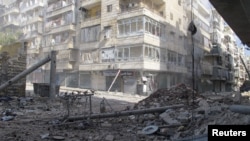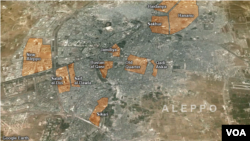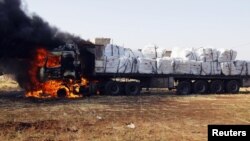Syrian government forces continued their aerial attacks against the besieged commercial center of Aleppo Thursday, driving many rebels from the southernmost district of the city in a fierce assault.
The government offensive comes as Syrian ally Iran hosted nearly 30 international envoys in Tehran to discuss ways to end the conflict. The conference was dismissed by the West as a large-number of Arab and Western powers were no-shows or not invited.
Heavy fighting was reported along the front lines of the southern perimeter of Aleppo in an area known as the Salaheddin district. Government forces shelled neighborhoods and bombed targets from the air in a concerted push to drive rebel fighters out.
Correspondents inside Aleppo say government forces captured chunks of territory, including parts of Salaheddin. Many rebel fighters reportedly pulled back to the Sakkour region farther north. State television claimed government forces retook several neighborhoods.
Al Jazeera TV reported that the government push was being aided by newer T-82 tanks, which are less vulnerable to attack from standard rocket-propelled grenades. Several rebel commanders also complained that they were running low on weapons and munitions.
Watch video of fighting, destruction in Aleppo, Syria
Heavy government shelling was also reported in other towns and cities, including Homs, Rastan, Deir Ezzor, and towns near the southern flashpoint city of Daraa.
Rebels want help
Rebel field commander Malek al-Kurdi said in an interview with VOA's Persian service on the Turkish-Syrian border that rebels desperately need international help.
"We had wanted an active role from the international community to take a bold decision to stop the massacres in Syria," he said. "But the delay and the modest capabilities of the Free Syrian Army has put the Syrian situation in a state of limbo."
"This has opened the way for extremist groups from different places with goals separate from the Syrian people to get financial support to continue the revolution," he said.
Meanwhile, Syrian media reported that Wael al-Halqi, a gynecologist from Daraa, was appointed as the new prime minister, following the defection earlier this week of former prime minister Riad Hijab to Jordan.
In diplomatic developments, Iran organized a conference to discuss what it billed as a new peace initiative for Syria. Iranian state television showed nearly 30 envoys including ones from Russia, China, Turkey, India, Iraq, and a number of Latin American countries.
Iranian Foreign Minister Ali Akbar Salehi, who had just returned from a visit to Turkey, chaired the conference telling participants that Tehran supports dialogue and reconciliation in Syria.
Salehi called for a national dialogue between the Syrian opposition and the government in order to restore peace and security. He said that Iran was ready to host negotiations, adding that Tehran was opposed to outside meddling and military intervention to resolve the conflict.
The U.S. and its Western allies are not attending and have dismissed the conference as an attempt to divert attention away from the violence in Syria.
Iran's motives
Scott Lucas, a professor of international policy at the University of Birmingham in Britain, said that Iranian leaders are trying to decide what to do, now that longtime Syrian ally, President Bashar al-Assad, is in trouble.
"The Iranians are scrambling right now," he said. "They're on the defensive, and that's because over the last few weeks it's become pretty clear to them that Assad is in a very tenuous position and that he may not survive. And so if that's the case, they've got to start thinking about a plan B.”
Lucas, who and edits the blog 'EA Worldview,' said Iran could be trying to “portray its conference as a counter-weight to the (much larger) Friends of Syria group” formed by the U.S. and the West.
Lucas added that Tehran may have felt obliged to hold the meeting because Saudi Arabia will host an Organization of Islamic Cooperation meeting next week to talk about Syria.
U.S. Secretary of State Hillary Clinton is due to visit Turkey over the weekend to discuss the conflict in Syria.
U.S. counter-terrorism advisor John Brennan said Tuesday, in a speech to the Council on Foreign Relations in Washington, that he could not rule out the imposition of a no-fly zone over Syria.
"I don't recall the president every saying that anything is off the table," he said. ""The U.S. government always looks at situations and looks at what types of scenarios might unfold and then accordingly looks at what type of contingency plans might be available to deal with certain circumstances."
Help for refugees
source: UNHCR
Many nations are stepping up humanitarian assistance to Syria.
A team of French military doctors left Paris Thursday for Jordan, where the group will set up along the Jordanian-Syrian border to treat Syrian refugees.
The 25 medical personnel are flying about 20 tons of medical equipment with them to the Jordanian capital of Amman.
The doctor heading the mission, Gerard Dosseh, said the team aims to be operational by the end of the week. The group will be able to perform up to 10 surgeries a day.
Hundreds of thousands of Syrians have fled to neighboring countries to escape the violence in their homeland, while many others are internally displaced.
In all, the Syrian Observatory for Human Rights says more than 20,000 people have been killed across the country since the uprising began in March of last year.
Some information for this report was provided by AP, AFP and Reuters
Photo Gallery: Latest Images from Syria
The government offensive comes as Syrian ally Iran hosted nearly 30 international envoys in Tehran to discuss ways to end the conflict. The conference was dismissed by the West as a large-number of Arab and Western powers were no-shows or not invited.
Heavy fighting was reported along the front lines of the southern perimeter of Aleppo in an area known as the Salaheddin district. Government forces shelled neighborhoods and bombed targets from the air in a concerted push to drive rebel fighters out.
Correspondents inside Aleppo say government forces captured chunks of territory, including parts of Salaheddin. Many rebel fighters reportedly pulled back to the Sakkour region farther north. State television claimed government forces retook several neighborhoods.
Al Jazeera TV reported that the government push was being aided by newer T-82 tanks, which are less vulnerable to attack from standard rocket-propelled grenades. Several rebel commanders also complained that they were running low on weapons and munitions.
Watch video of fighting, destruction in Aleppo, Syria
Heavy government shelling was also reported in other towns and cities, including Homs, Rastan, Deir Ezzor, and towns near the southern flashpoint city of Daraa.
Rebels want help
Rebel field commander Malek al-Kurdi said in an interview with VOA's Persian service on the Turkish-Syrian border that rebels desperately need international help.
"We had wanted an active role from the international community to take a bold decision to stop the massacres in Syria," he said. "But the delay and the modest capabilities of the Free Syrian Army has put the Syrian situation in a state of limbo."
"This has opened the way for extremist groups from different places with goals separate from the Syrian people to get financial support to continue the revolution," he said.
Meanwhile, Syrian media reported that Wael al-Halqi, a gynecologist from Daraa, was appointed as the new prime minister, following the defection earlier this week of former prime minister Riad Hijab to Jordan.
In diplomatic developments, Iran organized a conference to discuss what it billed as a new peace initiative for Syria. Iranian state television showed nearly 30 envoys including ones from Russia, China, Turkey, India, Iraq, and a number of Latin American countries.
Iranian Foreign Minister Ali Akbar Salehi, who had just returned from a visit to Turkey, chaired the conference telling participants that Tehran supports dialogue and reconciliation in Syria.
Salehi called for a national dialogue between the Syrian opposition and the government in order to restore peace and security. He said that Iran was ready to host negotiations, adding that Tehran was opposed to outside meddling and military intervention to resolve the conflict.
The U.S. and its Western allies are not attending and have dismissed the conference as an attempt to divert attention away from the violence in Syria.
Iran's motives
Scott Lucas, a professor of international policy at the University of Birmingham in Britain, said that Iranian leaders are trying to decide what to do, now that longtime Syrian ally, President Bashar al-Assad, is in trouble.
"The Iranians are scrambling right now," he said. "They're on the defensive, and that's because over the last few weeks it's become pretty clear to them that Assad is in a very tenuous position and that he may not survive. And so if that's the case, they've got to start thinking about a plan B.”
Lucas, who and edits the blog 'EA Worldview,' said Iran could be trying to “portray its conference as a counter-weight to the (much larger) Friends of Syria group” formed by the U.S. and the West.
Lucas added that Tehran may have felt obliged to hold the meeting because Saudi Arabia will host an Organization of Islamic Cooperation meeting next week to talk about Syria.
U.S. Secretary of State Hillary Clinton is due to visit Turkey over the weekend to discuss the conflict in Syria.
U.S. counter-terrorism advisor John Brennan said Tuesday, in a speech to the Council on Foreign Relations in Washington, that he could not rule out the imposition of a no-fly zone over Syria.
"I don't recall the president every saying that anything is off the table," he said. ""The U.S. government always looks at situations and looks at what types of scenarios might unfold and then accordingly looks at what type of contingency plans might be available to deal with certain circumstances."
Help for refugees
Syrian Refugees
The UNHCR says more Syrians are fleeing as violence increases. Most are heading to the following countries:- Jordan: 150,000 refugees
- Turkey: 70,000 refugees
- Lebanon: More than 35,000 refugees
- Iraq: 12,000 registered refugees
- Algeria: 10-25,000 refugees
source: UNHCR
A team of French military doctors left Paris Thursday for Jordan, where the group will set up along the Jordanian-Syrian border to treat Syrian refugees.
The 25 medical personnel are flying about 20 tons of medical equipment with them to the Jordanian capital of Amman.
The doctor heading the mission, Gerard Dosseh, said the team aims to be operational by the end of the week. The group will be able to perform up to 10 surgeries a day.
Hundreds of thousands of Syrians have fled to neighboring countries to escape the violence in their homeland, while many others are internally displaced.
In all, the Syrian Observatory for Human Rights says more than 20,000 people have been killed across the country since the uprising began in March of last year.
Some information for this report was provided by AP, AFP and Reuters
Photo Gallery: Latest Images from Syria







